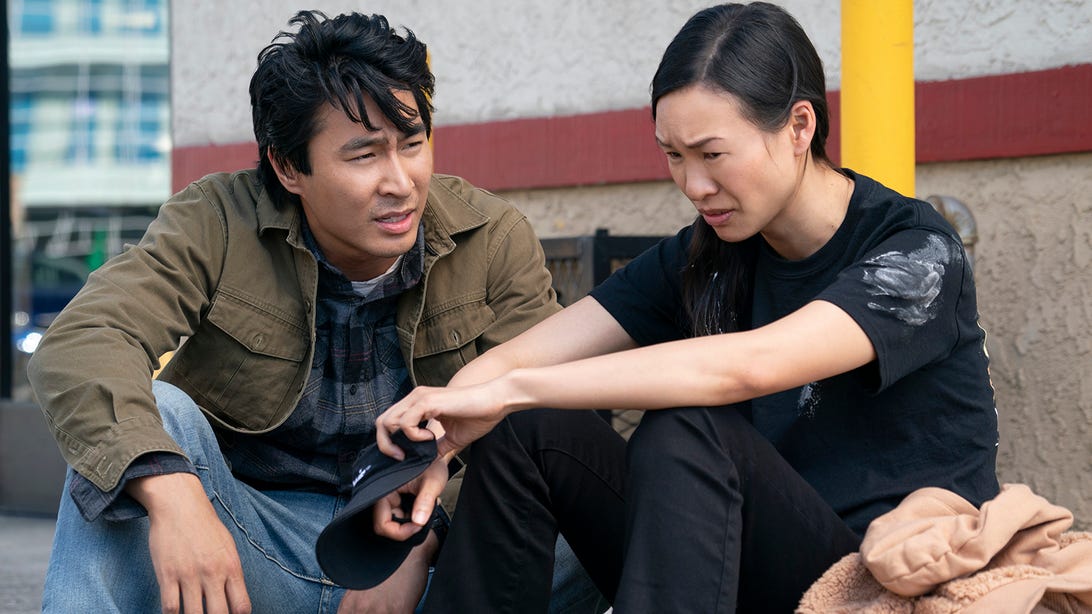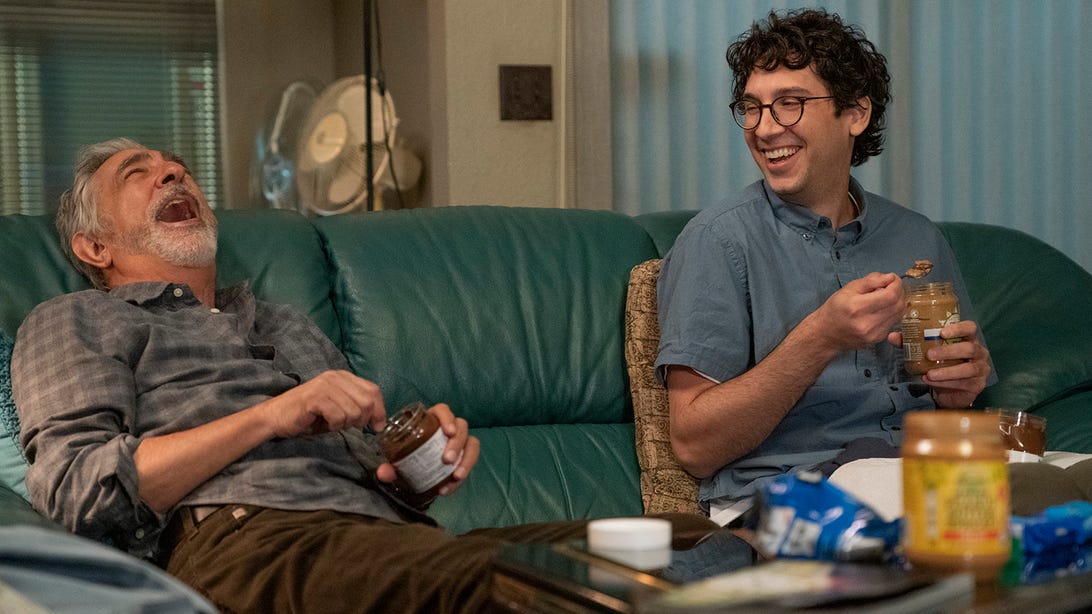Join or Sign In
Sign in to customize your TV listings
By joining TV Guide, you agree to our Terms of Use and acknowledge the data practices in our Privacy Policy.
How Amazon's As We See It Creates an Inclusive Set for People With Autism
Rick Glassman, Sue Ann Pien, and Albert Rutecki talk to TV Guide about starring in the dramedy from Jason Katims

Rick Glassman, Sue Ann Pien, Albert Rutecki, As We See It
Amazon Prime VideoWhen Sue Ann Pien read the script of As We See It for the first time, she knew right away that it was going to be a special project. "I had never read an autistic character that I just immediately felt, inside and out, I knew who that was because it mirrored so much of my own experiences in life," Pien told TV Guide. She plays Violet, who, like Pien, is on the autism spectrum. As We See It, the new Amazon Prime Video dramedy from Friday Night Lights and Parenthood producer Jason Katims, follows three autistic roommates in their 20s, Violet, Jack (Rick Glassman), and Harrison (Albert Rutecki), who each face different challenges in their jobs, social lives, and love lives. But they venture out of their comfort zones and celebrate wholeheartedly when they are one step closer to their goals. Much of this process reflects Pien's own experiences. "The show has been a huge milestone towards acceptance, self-acceptance," she said.
Like Violet, Jack and Harrison are played by actors who identify as living on the spectrum. It's a personal story for the three leads, and it's a personal story for Katims. A few years ago, the television writer, who has a son on the spectrum, was thinking about the subject of adults with autism. "It occurred to me, there aren't a lot of stories out there about adults on the spectrum," Katims said at a virtual panel for As We See It. "You hear a lot, read a lot, see a lot about childhood, and then you realize that all of those people grow up and become adults."
Katims had his "light bulb moment" when he came across an Israeli television show called On the Spectrum, produced by Yuval Shafferman and Udi Segal, about three roommates with autism. He decided to adapt it into an American series, with Shafferman and Segal joining him as executive producers of the Amazon show. The cast is rounded out by Chris Pang as Violet's brother Van, Joe Mantegna as Jack's father Lou, and Sosie Bacon as the three roommates' aide, Mandy.
As We See It, which is now streaming its full first season on Prime Video, is a step forward in autism representation both in the portrayal of its main characters and in the casting of its leads. Behind the scenes, the participation of neurodiverse crew members also led to a more inclusive filming environment.
The series tells a layered story about autism
When Rick Glassman, who plays Jack, auditioned for As We See It, he had just been diagnosed with autism three or four years earlier. He didn't yet have much exposure to the range of what being on the spectrum could look like. "Before this show, I had one autistic friend," he said. Then he started this project and met Pien and Rutecki, and the two characters they play, in addition to his own. "In a way, there are six people with autism on set," he said, noting that although the actors and characters all share some similarities, there are just as many differences between them. Glassman was attracted to the series because it offered the chance to tell so many varied stories about being on the spectrum.
For Pien, her character represents an intersection of identities. "It's incredible to be able to showcase Violet in the world so people understand, one, if you're not autistic, that there are people who have different challenges and struggles that may not always be very visible off the bat," she explained. "They call it an invisible disability for a reason." It was special for her to be able to play a woman who is autistic, given that there have been fewer onscreen portrayals of women on the spectrum. "I'm really excited about people watching a female on the spectrum that is realistic and authentic," she said.
The fact that Violet is a woman of color, and more specifically an Asian woman, adds another layer to the story. Pien spoke of the stigma around mental health in Asian culture that she experienced growing up. "My parents, it was different for them. There's a lot more unspoken, mental health is not taken care of," she said. From a young age, she knew it was bad to stick out "like a sore thumb." Violet's relationship with her overprotective brother, Van, is a rare media depiction of members of an Asian family navigating a disability. "To show an Asian person who is autistic, that's groundbreaking," Pien said.

Chris Pang and Sue Ann Pien, As We See It
Amazon Prime VideoAuthentic casting opens doors
While Pien often feels the need to act like "a normal human being" in the world, she said she didn't feel she had to on set. "I don't have to hide anything about myself," Pien said of the filming experience. "And when you have an authentic portrayal like that, I think you're gonna hit emotional notes that are just so much richer and deeper than somebody trying to wing that."
Glassman feels similarly. "I don't have a strong stance that people on the autism spectrum should be the only people playing autistic, nor do I feel that people on the autism spectrum should only be playing those characters," he said. But by having actors on the spectrum star in these roles — and, more broadly, people from underrepresented groups star as characters from those respective groups — "you will also notice how much more authentic and honest these stories are being told," Glassman said.
Albert Rutecki, who plays Harrison, recalled seeing plenty of bad portrayals of autism growing up. "So when I was diagnosed a little later, it was like, and that character is supposed to be autistic? Really?" he said. These portrayals were often cartoonish and one-note. "I think it's a good thing to have people who have more knowledge of this area, or at least [people who] put that care into it, to try to get the part right or get the writing done well."
In As We See It, the three leads are not the only autistic actors on set. "We have a plethora of guest stars and recurring characters coming on the autism spectrum," Glassman shared. They include Robby Clater, who plays Jack's boss, Austin; Tal Anderson, who plays a member of the drama club, Gia; Lillian Carrier; Naomi Rubin; and Anthony Jacques.
In Glassman's eyes, the casting of this series is also significant for how it could lead to future opportunities. "On a bigger picture, it's not just about representation," he said. Glassman pointed out Rutecki as an example: "Albert, he's a theater brat. He knows how to use the boards really well, but this is his first time on a big television production like this, and that's a doorway into other roles, whether it be autistic or otherwise."
The crew creates an inclusive environment on set
Behind the scenes, As We See It's production team included people who are autistic. It also included those who are not on the spectrum but have a loved one close to them who is. This led to a filming environment that was more aware and kind, the leads said. "That love and care and compassion, only somebody who's lived with someone [with autism] in close proximity for like 20, 30, 40 years of their lives understands intuitively how to comfort and be around us," Pien said of her experience with the crew.
Glassman said that members of the production team minimized large noises on set out of consideration for people who are hypersensitive to certain stimulants, including himself. He recalled the noise from a ladder hitting another ladder during filming, and noted that while accidents like that are going to happen, there was a heightened awareness from the crew toward avoiding those incidents.

Joe Mantegna and Rick Glassman, As We See It
Amazon Prime VideoThe production team put extra care into how information was communicated. "You need to sometimes speak slower to an autistic person because the processing speeds are very different," Pien said. "Growing up in school, I had no idea what the f--- the teachers were saying, and I would look at the other kids and then slowly piece together what I'm supposed to be doing."
People on set were also mindful about talking in a literal manner. "The way you communicate to an autistic person, put it in the cleanest, easiest, most simple form," Pien said. "Can you go do this? Can you be here at this time?" She shared that as a kid, when her mom asked questions like whether she wanted to help with the groceries, Pien replied no. "I was like, if I didn't have a choice in that, why are you asking me a question about it?" she recalled. The crew members took care to minimize that kind of confusion while filming.
Glassman believes this type of awareness does not have to be limited to sets with people on the spectrum or sets working on stories about autism. He hopes that those who worked on As We See It bring some of what they experienced on set to future projects. "Having more experience with people working with autism will help in so many ways outside of just the entertainment," Glassman said.
It's a big part of why when asked about next steps for autism representation in media, Rutecki's response is twofold: "More opportunities for people both in front and behind the camera," he said.
As We See It Season 1 is now streaming on Prime Video.
